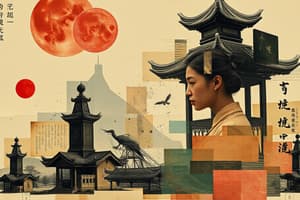Podcast
Questions and Answers
什么是左翼文学,它的主要目标是什么?
什么是左翼文学,它的主要目标是什么?
左翼文学是由共产党倡导的文学运动,旨在推广反映工人阶级斗争并倡导革命理想的社会意识作品。
现实主义文学在二战期间的中国是如何表现的?
现实主义文学在二战期间的中国是如何表现的?
受到西方现实主义的影响,中国现实主义出现,以描绘日常生活和以批判的眼光代表人类状况为特征。
现代主义文学在二战期间的中国是如何突显个性、实验和拒绝传统文学规范的?
现代主义文学在二战期间的中国是如何突显个性、实验和拒绝传统文学规范的?
现代主义文学强调实验性、个人主义和拒绝传统文学规范,在这一时期获得了重要地位。
二战期间的中国文学如何挑战传统规范?
二战期间的中国文学如何挑战传统规范?
二战期间的政治环境如何影响文学?
二战期间的政治环境如何影响文学?
在中国第二次国共合作时期(1928-1937年),现代文学经历了怎样的转变?
在中国第二次国共合作时期(1928-1937年),现代文学经历了怎样的转变?
第二次国共合作时期对现代文学的发展有何影响?
第二次国共合作时期对现代文学的发展有何影响?
在第二次国共合作时期,现代中国文学是如何呈现新的文学形式的?
在第二次国共合作时期,现代中国文学是如何呈现新的文学形式的?
第二次国共合作时期的文学运动对中国文学有何影响?
第二次国共合作时期的文学运动对中国文学有何影响?
谈谈第二次国共合作时期的文学风格变化。
谈谈第二次国共合作时期的文学风格变化。
Flashcards are hidden until you start studying
Study Notes
Literature in China's Second United Front Period (1928-1937)
During the Second United Front period, China's literature underwent transformative changes, reflecting the complex political climate and cultural shifts. This era, spanning from 1928 to 1937, saw the formation and maturation of modern Chinese literature, prominent literary movements, and the influence of the Second United Front on this artistic landscape.
Development of Modern Literature
The Second United Front period marked a turning point in China's literary history. Literary modernization, which had begun in the May Fourth Movement, continued to flourish, resulting in the emergence of new literary forms, themes, and styles.
- New literary forms: Novels, short stories, and plays gained popularity, with authors experimenting with new narrative structures, using a more natural and colloquial language.
- Themes: Modern Chinese literature embraced topics such as the individual, social issues, and China's national identity, often in the context of political upheaval and cultural transformation.
- Influential authors: Notable authors from this period include Lu Xun, Mao Dun, Ba Jin, and Zhang Ailing, each contributing to the development of modern Chinese literature through their pioneering works.
Literary Movements and Styles
The Second United Front period fostered the growth of several significant literary movements:
- Left-wing literature: This movement, championed by the Communist Party, sought to promote socially-conscious works that reflected the struggles of the working class and championed revolutionary ideals.
- Realism: Influenced by Western realism, Chinese realism emerged, characterized by the portrayal of everyday life and the representation of the human condition with a critical eye.
- Modernism: Modernist literature, with its emphasis on experimentation, individualism, and a rejection of conventional literary norms, gained prominence during this period.
These movements and styles coexisted, reflecting the diverse and nuanced landscape of Chinese literature during this time.
Impact of the Second United Front Period on Literature
The Second United Front period left a profound impact on Chinese literature.
- Challenges to traditional norms: Literature during this time challenged traditional norms, embracing new forms and styles that departed from Confucian ideals and orthodox literary traditions.
- Political influences: The political climate of the Second United Front period influenced literature, with authors addressing themes of national identity, social injustice, and revolutionary ideals.
- Cultural exchanges: The Second United Front period facilitated cultural exchanges between China and the West, with Chinese literature being exposed to Western influences, such as realism and modernism, while Western literature became more familiar with Chinese culture.
- Promotion of Chinese literature: The Second United Front period saw the promotion of Chinese literature both within China and abroad, leading to increased awareness of Chinese literary traditions and an influx of translations of Chinese works into Western languages.
In conclusion, literature during the Second United Front period in China (1928-1937) was characterized by the development of modern forms, the emergence of new literary movements, and the profound impact of the Second United Front period on the artistic landscape. This era proved to be a turning point in Chinese literature, setting the stage for the literary developments that followed.
Studying That Suits You
Use AI to generate personalized quizzes and flashcards to suit your learning preferences.




